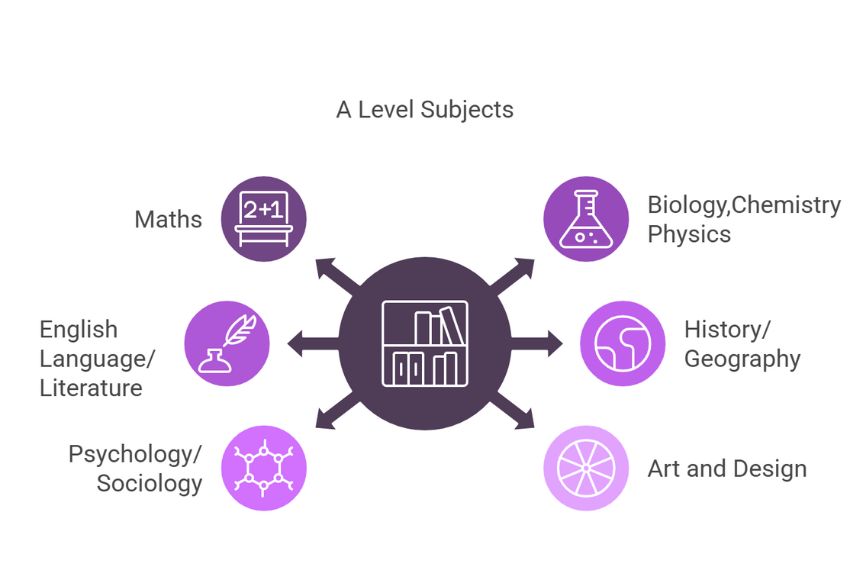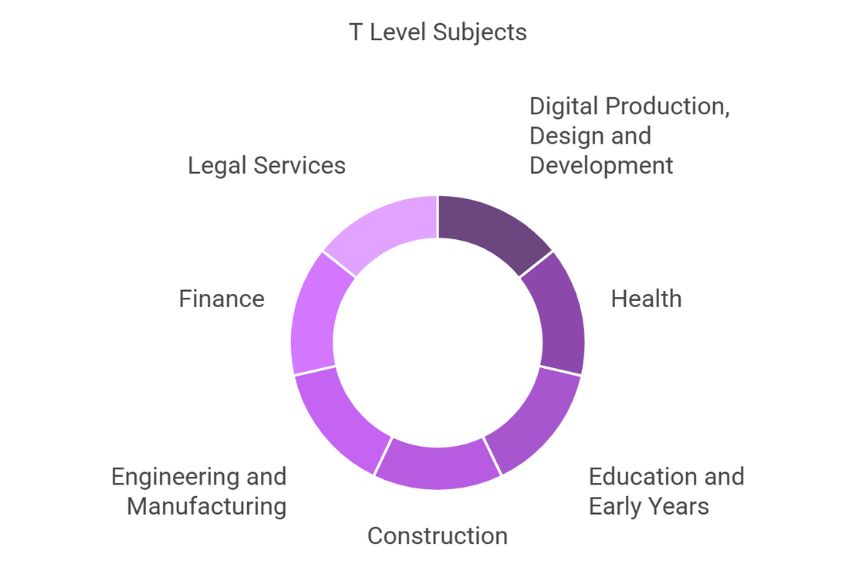After completing your GCSEs, you’ll have some big choices to make about what comes next. Two of the most common options in the UK are A Levels and T Levels, but understanding the differences between them isn’t always easy, especially if it’s your first time hearing about T Levels.
Choosing between T Levels and A Levels isn’t about picking the “better” option, it’s about finding what works best for you. Your learning style, future goals, and interests all play a part. This blog will break everything down step by step, so you can understand how each qualification works, how they compare, and which one might be the right fit for your next steps.
T Levels vs A Levels – What Are A Levels?
A Levels are one of the most common routes students take after GCSEs. They’re academic qualifications that focus on in depth study of a few subjects over two years. Most students choose three A Level subjects, though some take four, especially if they’re aiming for top university places. You’ll usually study these subjects in Year 12 and Year 13 (Sixth Form or College).
A Levels are mainly assessed through final exams at the end of the course. Some subjects, like English or Art, also include coursework, but exams still play the biggest role in your final grade. You can choose from a wide range of subjects including – Modern Foreign Languages, Economics or Business. Other subjects are:

A Levels are a great option if you’re aiming for university or want to keep your future options open.
T Levels vs A Levels – What Are T Levels?
While A Levels are more academic, T Levels are a newer option designed for students who prefer practical learning and want to focus on a specific career path. They were introduced in 2020 to help bridge the gap between classroom study and real world skills.
T Levels are technical qualifications that focus on one subject area over two years. Instead of choosing multiple subjects like in A Levels, you’ll specialise in just one, For example, Digital Production, Education, Health, or Engineering. T Levels were introduced by the government to give students a more option after GCSEs.
One of the main features of T Levels is the industry placement. You’ll spend around 45 days (or 315 hours) working with a real employer in a real job role. This gives you hands on experience and helps build the skills you’ll actually use in the workplace.
T Levels are assessed in different ways, including written exams, coursework, and practical projects. The balance depends on the subject, but overall, you’ll be tested on both your knowledge and how well you can apply it in real situations. Here are just a few examples of T Level subjects:

T Levels are a great option if you already have a career path in mind and want to gain both knowledge and experience to help you get there.
What Are The Differences Between T Levels and A Levels?
Now that you know what T Levels and A Levels are, let’s look at how they compare. Both are two-year qualifications, but they’re quite different in how they’re taught, assessed, and where they can lead you.
Focus and Content
A Levels offer a broad academic approach. You usually study three subjects, giving you a mix of knowledge across different areas. This is ideal if you enjoy academic study and want to keep your options open. T Levels focus on one subject linked to a specific industry, like Health, Digital, or Engineering.
Assessment Methods
A Levels are mostly assessed through written exams at the end of the two years, with a bit of coursework depending on the subject.
T Levels use a mix of exams, coursework, and practical tasks, so if you prefer varied assessments rather than just exams, this could be a better fit.
Industry Experience
A Levels usually don’t include any formal work placement. T Levels include a mandatory industry placement, about 45 days where you get real experience working in your chosen field. This is a great way to build skills and make useful connections.
UCAS Points and Recognition
T Levels and A Levels both carry UCAS points and are recognised by universities and employers. A T Level with a top grade is worth the same UCAS points as three A Levels. While A Levels have been around longer, more universities are now accepting T Levels for certain courses, especially in related fields. Overall, the right choice depends on how you like to learn and what you want to do in the future.
Pros and Cons of A Levels
So, what makes A Levels a good option and what should you watch out for? Let’s go through it in details.
Pros of A Levels
You can study more than one subject – This is perfect if you enjoy variety or aren’t sure what you want to do yet.
They’re widely recognised – A Levels are accepted by all UK universities and many employers.
They keep your options open – Whether you’re aiming for university, an apprenticeship, or another path, A Levels give you flexibility to change direction later on.

Cons of A Levels
Not much hands-on experience – If you enjoy learning by doing or want to work straight after school, A Levels might feel too focused on theory.
Heavy focus on exams – Most subjects are assessed through final exams, which might not suit all learning styles.
A Levels are a great choice for students who enjoy academic study and want to keep their future choices broad. If you want practical or job based learning then it can’t be right fit for you.
Pros and Cons of T Levels
Now let’s take a closer look at the pros and cons of T Levels. If you’re someone who likes learning through doing and has a clear idea of the career you want, this could be a great path for you.
Pros of T Levels
You get hands-on experience – The course includes a long industry placement, helping you build real skills and confidence in a work setting.
You focus on one area – This lets you dive deep into a subject and learn exactly what’s needed for jobs in that industry.
They’re designed with employers in mind – T Levels were created with help from businesses, so you’re learning the skills that are actually needed in the workplace.
Cons of T Levels
Fewer subjects to choose from – Compared to A Levels, the subject list is more limited—so you’ll need to be sure about your choice.
Still quite new – Some universities and employers are still getting familiar with T Levels, so they might not be accepted everywhere just yet.
Less flexible if you change your mind – Since you focus on one subject, it can be harder to switch to a completely different field later on.
Factors to Consider When Choosing Between T Levels and A Levels
Still unsure which path is right for you? That’s completely normal. Choosing between T Levels and A Levels isn’t just about which one sounds better, it’s about what fits your goals and how you like to learn.
- Think about your learning style: Do you enjoy writing essays, studying theory, and taking exams? If so, A Levels might suit you better. But if you prefer hands on learning and real world tasks, T Levels could be the right choice.
- Consider your future career plans: If you already have a specific job or industry in mind, like healthcare, construction, or digital media – T Level can help you build the skills and experience to get there. If you’re still figuring things out, A Levels give you more flexibility to explore different options later.
- Think about how you like to learn: T Levels offer a mix of classroom study and industry placement, while A Levels are mostly based in the classroom. Ask yourself: Do you want more time learning through experience, or do you prefer academic study?
- Check what’s available near you: Not all schools and colleges offer the same subjects. It’s important to see whether your chosen A Level subjects or preferred T Level course are available in your area.
In the end, the best choice is the one that matches your strengths, interests, and goals. Take your time and don’t be afraid to ask for advice if you need it.
Conclusion
In the end, deciding between T Levels and A Levels is a big decision, but it doesn’t have to feel stressful. Both of them have their own strengths, and the right one depends on how you learn best, what you enjoy, and where you see yourself in the future.
If you’re feeling unsure or need extra support with your subjects, online tutors can make a huge difference. Here, you can connect with experienced A Level and GCSE tutors who understand the curriculum and how to explain it clearly. Whether you’re studying for exams or just need help choosing the right path, there’s always someone ready to support you.
You Might Find This Interesting
Sixth Form Explained: from GCSEs to A Levels
Top 10 Hardest A Level Subjects in 2025
Top 15 Easiest A Level Subjects
FAQ’s
Are T Levels better than A Levels?
Not exactly better, just different. T Levels are great for students who want to focus on one subject and gain real work experience in that area. A Levels are ideal if you want to keep your options open and study more than one subject.
Are T Levels harder than A Levels?
Both come with their own challenges. A Levels are more academic, with lots of exam preparation across different subjects. T Levels take a more focused approach, combining classroom learning with real world industry experience. In the end it really depends on your learning style.
Does Cambridge accept T levels?
No, the University of Cambridge does not currently accept T Levels for admission. They’ve said the available subjects don’t align with their courses, but this may change in the future.
Which A Levels are most respected?
Top universities value A Levels in subjects like Maths, Further Maths, Physics, Chemistry, Biology, English Literature, History, and Modern Languages. These “facilitating subjects” help students access a wide range of degree courses.








